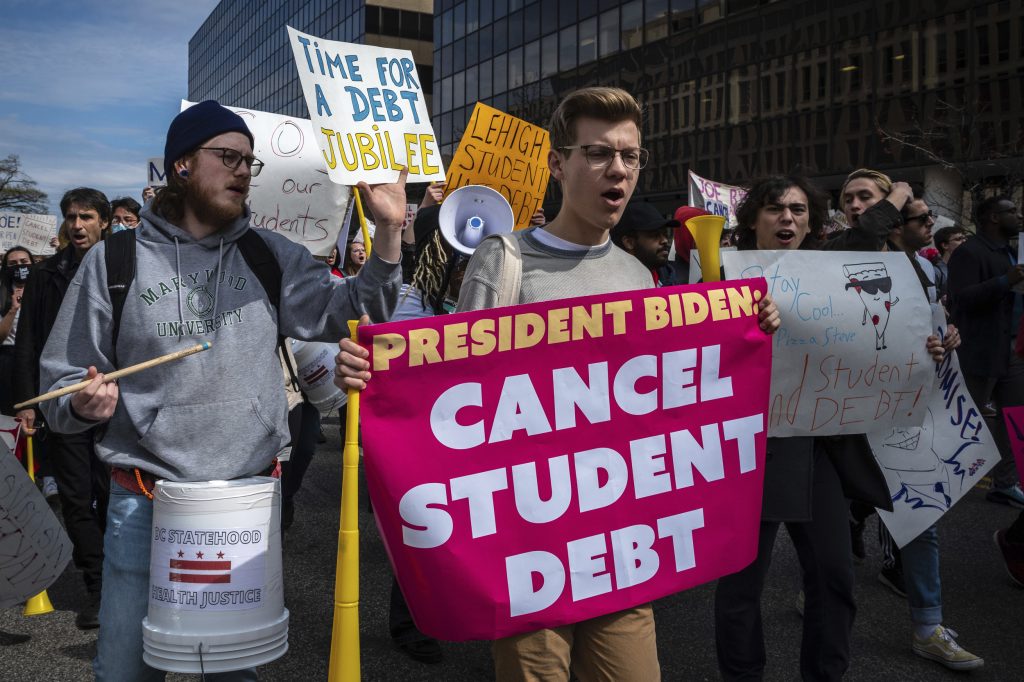A federal judge in Texas suspended the program, declaring it to be “an unlawful exercise of Congress’s legislative power,” and the Education Department has since ceased accepting new applications.
The decision is the program’s biggest setback so far, postponing the debt forgiveness of up to $20,000 per borrower for 40 million debtors due to numerous legal challenges.
“Courts have issued orders blocking our student debt relief program,” the federal student aid website says. “As a result, we are not accepting applications at this time. We are seeking to overturn those orders.”
According to the White House, 26 million borrowers have already requested debt relief, and 16 million have already been granted. In a statement, White House Press Secretary Karine Jean-Pierre said that “the Department will hold onto their information so it can swiftly process their relief whenever we succeed in court.”

Legal authorities have expressed doubt regarding the legal standing of any plaintiff—someone who has suffered a real, present harm—to contest the student debt forgiveness program successfully. Several judges have dismissed earlier lawsuits for lack of standing, but this most recent decision broke that trend.
The Job Creators Network Foundation filed this action, alleging that the debt-forgiveness program broke the Administrative Procedure Act by failing to solicit public input on the proposal and harming two plaintiffs who didn’t qualify for debt relief. Student loans owed by one of the plaintiffs are currently held privately and are not eligible for cancellation. Because the second plaintiff did not obtain a Pell Grant to assist low-income students attending college, he was only qualified for $10,000 in debt forgiveness—not $20,000—instead.
“Plaintiffs want an opportunity to present their views to the Department and to provide additional comments on any proposal from the Department to forgive student loan debts,” the lawsuit states, calling it “irrational, arbitrary, and unfair” to exclude them from relief.
They have standing to sue because they were denied the right to comment on the fact that they were ineligible for debt forgiveness, according to U.S. District Judge Mark Pittman, who also agreed with them.
Pittman wrote in his decision, “Plaintiffs have successfully alleged the deprivation of a procedural right.”
The Department of Justice appealed the decision, and the 5th Circuit Court of Appeals will review the matter.

The issue of legal standing is still up for debate as this case moves forward on appeal, according to Tara Grove, a professor at the University of Texas School of Law. She specializes in the federal judiciary and the separation of powers. “It is hard to stand to challenge this program,” Grove says.
“Fundamentally, this comes down to the question, ‘Well, can I complain about other people getting benefits?’” she says. “This is not a situation where they were not allowed to apply for benefits. They didn’t meet the requirements of the program.”
Grove believes that the Biden Administration’s strongest defense is that the plaintiffs lack legal standing to file a lawsuit, noting that the government’s defense of the policy’s legal justification may be more difficult to sustain.
Similar to past lawsuits, this one alleged that Biden lacked the power to provide extensive debt relief. The Higher Education Relief Opportunities for Students (HEROES) Act of 2003, which grants the Education Department the authority to alter student financial assistance programs during a “national emergency,” served as the basis for the Biden administration’s justification for the proposal. The COVID-19 pandemic, according to the Biden Administration, is such an emergency.
The HEROES Act “does not afford the executive branch clear congressional power to implement a $400 billion student loan forgiveness program,” Pittman ruled on Thursday. (The Congressional Budget Office projected the plan’s cost to be around $400 billion in a report released in September.)
“In this country, we are not ruled by an all-powerful executive with a pen and a phone,” he said.
Executive director of the nonprofit Student Debt Crisis Center, Cody Hounanian, claims the center has heard from many borrowers who had viewed debt relief as “a light at the end of the tunnel” and are now irritated to be caught in legal limbo.
“I share many of the feelings other borrowers feel as well. I’m incredibly frustrated. I have a sense of uncertainty and confusion about what the future has in store,” says Hounanian, who applied for debt relief as soon as the site launched. “It makes it hard to plan for the future.”
